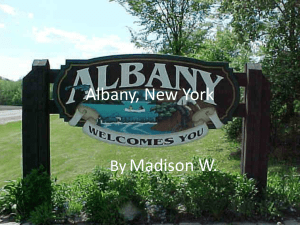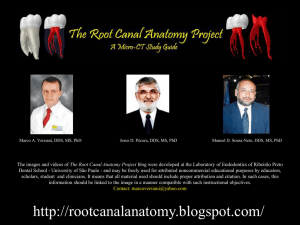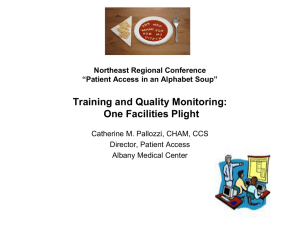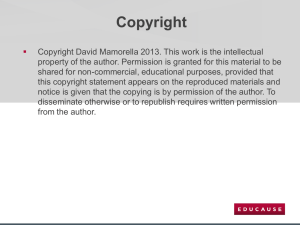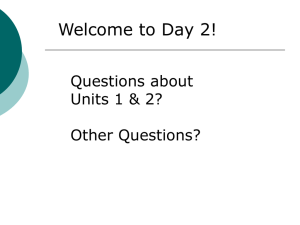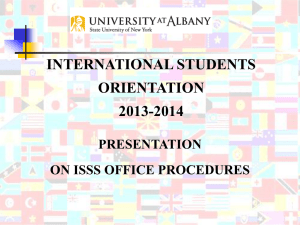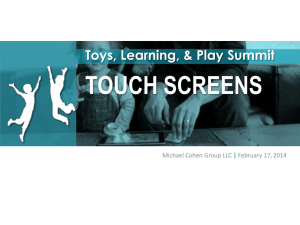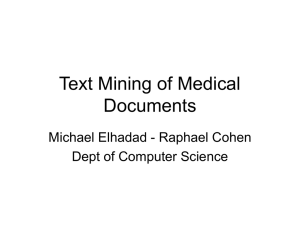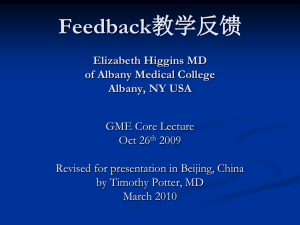Future Search Presentation, Shem Cohen
advertisement
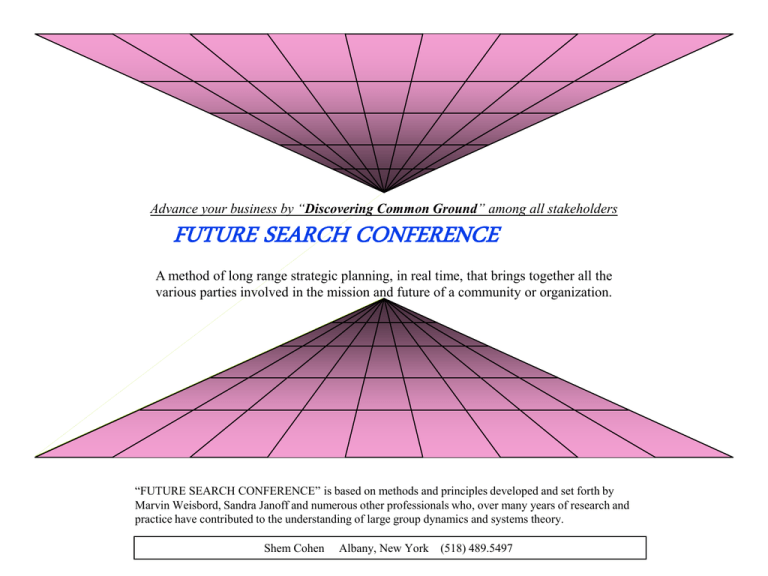
Advance your business by “Discovering Common Ground” among all stakeholders FUTURE SEARCH CONFERENCE A method of long range strategic planning, in real time, that brings together all the various parties involved in the mission and future of a community or organization. “FUTURE SEARCH CONFERENCE” is based on methods and principles developed and set forth by Marvin Weisbord, Sandra Janoff and numerous other professionals who, over many years of research and practice have contributed to the understanding of large group dynamics and systems theory. Shem Cohen Albany, New York (518) 489.5497 It is . . . An Alternative to “Doing the Same Old Things” and “Getting the Same Old Results” A method of strategic planning, in real time, with both external and internal stakeholders present. The unique, highly effective Future Search Conference approach goes beyond traditional strategic planning and involves the entire “community” surrounding the organizational entity searching for its desirable future. Key outcomes are: People move from boundary feuds and protecting special interests to mutual cooperation and support. The entire community looks beyond their assumptions and fears to common ground “outside the box”. Mutual understanding and focus develops to increase commitment and support to implement and sustain action plans and change strategies. It Is Not . . . A forum to “work issues” Conflict resolution Problem solving methods A place to lobby, “sell” or manipulate decision-making Shem Cohen Albany, New York (518) 489.5497 Framework “How this approach differs from typical participative meetings” The WHOLE SYSTEM participates ~ a cross-section of as many interested parties as practical. That means more diversity and less hierarchy than usual in a working meeting, and a chance for each person to be heard and learn other ways of looking at the task at hand. Future scenarios ~ for an organization, community or issue ~ are put into HISTORICAL and GLOBAL perspectives. That means thinking globally together before acting locally. This feature enhances shared understanding and greater commitment to act. It also increases the range of potential actions. People SELF-MANAGE their work, and use DIALOGUE ~ not “problem solving” as the main tool. That means helping each other do the tasks and taking responsibility for our perceptions and actions. COMMON GROUND rather than “conflict management”, is the frame of reference. That means honoring our differences rather than having to reconcile them. Shem Cohen Albany, New York (518) 489.5497 WHEN To Do It Need to infuse energy and motivation to renew and revitalize organizations and/or networks Shift organizations in transition from the past to the future Identify and confront new or changed external conditions affecting the organization Generate support, congruence and commitment from all segments of the system Clarify the future purpose, roles and boundaries of the organization and its interfaces New leadership is taking over Opposing parties need to meet in a productive environment through an apolitical forum Other efforts to unify and create a shared vision of the future have stalled A key transition is eminent stemming from strong influences Shem Cohen Albany, New York (518) 489.5497 BENEFITS Influences and establish a common purpose and direction of the whole organizational system Identifies commonality and diversity Shares responsibility and control by all constituents instead of mandates from the “top” Fosters commitment to the organizational mission from all influences Broadens horizons and perspectives that guide short-term priorities Involves representation from internal and external influences at levels beyond leaders and experts Opens opportunities to meet a variety of different people with diverse points of view Creates ways to leverage information use and delivery as a competitive advantage Learn more about the challenges and help define ways to meet them Shem Cohen Albany, New York (518) 489.5497 Comparison CONVENTIONAL STRATEGIC PLANNING FUTURE SEARCH FEATURE Mindset Exclusive, proprietary Inclusive, open Internal Leadership with Staff support Participation Stakeholders from all segments 1-5 years Time Frame 5-10+ years Structure Flat, circular Hierarchical, pyramidal Control Top down Planning Method Projection, trend extrapolation Economic growth Reduction of anxiety Shem Cohen Acting “as if” based on desired future Values Orientation Economic growth, common purpose, contribution Psychological Resonance Commitment to community Output Document, ??? energy / commitment Shared Albany, New York (518) 489.5497 On-going task forces HOW to do it Someone thinks It’s a good idea Others join and form a 4-5 member Steering Committee Steering Committee establishes a 612 member Planning Committee Conference occurs Planning Committee develops plans for the Conference 16 hours over 3 days 35-100 participants 25% external stakeholders All participants stay for the entire conference Follow up and Support activities Action groups Implement initiatives Shem Cohen Albany, New York (518) 489.5497 Getting Started (Steering Committee) Future Search history, theory and practice Why bother doing a Search conference? Why bother doing it now? When should we do it? Who should be on the planning committee? How will we gain interest, enthusiasm and commitment from planning committee members? Shem Cohen Albany, New York (518) 489.5497 Getting Started (Planning Committee Tasks) Why bother doing a Search conference? When should we do it? What is the conference task? What is the focus ~ the organization, community, industry, profession, customers? Stakes of people present? Who are the possible stakeholders? Who benefits? Who needs to influence and be influenced? Who has the information required? How should the conference be configured? What are the time frames to explore? How far back and how far forward? Who should be invited and how will you get them in the “room:”? How will we document and communicate the outcomes? How will we implement action plans and initiatives? How will be follow up on commitments? What arrangements will be made,(logistics, location, materials) and how will get them done? Shem Cohen Albany, New York (518) 489.5497 Conference AGENDA Day 1 Day 2 AM Session 4 Full Group • Present trends, cont’d. Session 10 Full Group • Reality Dialogue Session 5 Mixed Groups • Present trends implications Session 11 Stakeholder &/or Theme Groups • Action Planning • Report out Session 6 • Owning the present • “Prouds & Sorries” Session 1 Mixed Groups • Welcome & Opening Remarks • Overview, agenda, ground rules • Introductions PM Day 3 Session 7 Mixed Groups • Create Ideal Futures Session 2 • Review of the Past on personal, organizational and “world” level Session 8 Mixed Groups • Present future scenarios “acting as if” Session 3 Stakeholder/Large group(s) • Review of Present Trends (Mind Map) • Identify common, external influences Session 9 Full Group • Identify common ground of the future Shem Cohen Albany, New York (518) 489.5497 Session 12 • Final Summaries and next steps • Closing Guidelines Working Agreement Conference Staff Set time and Tasks Participants Provide information / Create meaning Large Group Discussions Manage own small groups Keep purpose front & center Future scenarios / Action Groups All ideas are valid Everything is written on flip charts Ground Rules Listen to each other Observe time frames Seek common ground and action Differences and problems are acknowledged ~ not “worked” Stages of Change Contentment Renewal Denial Confusion Confrontation Surface & Acknowledge Open Forum & Dialogue A FS facilitator believes that: • Every person and every group is doing the best they can with what they have every minute of every day. • People do only what they are ready, willing and able to do. • People need not change their own minds or anyone else's for a group to discover its common ground and potential for action. A Theory of Facilitating • The facilitator's task is to keep the group whole and working together, not to fix problems, resolve differences, or motivate action. • Groups stay whole and develop greater capacity when they (a) discover their real differences in belief, skill, and function, and (b) integrate their capabilities for a common purpose. • Groups tend to fragment around differences, whether real or imagined. The facilitator's job is make sure no person becomes a scapegoat due to a personal trait, feeling, or point of view. • Facilitators are responsible for boundaries of time and task, not for content, analysis, direction, interpretation, meaning, or synthesis. Shem Cohen Albany, New York (518) 489.5497
